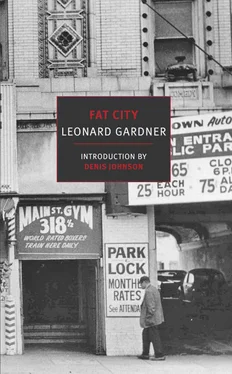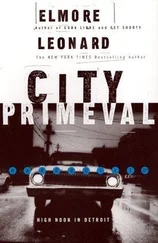Leonard Gardner - Fat City
Здесь есть возможность читать онлайн «Leonard Gardner - Fat City» весь текст электронной книги совершенно бесплатно (целиком полную версию без сокращений). В некоторых случаях можно слушать аудио, скачать через торрент в формате fb2 и присутствует краткое содержание. Год выпуска: 2015, Издательство: NYRB Classics, Жанр: Современная проза, на английском языке. Описание произведения, (предисловие) а так же отзывы посетителей доступны на портале библиотеки ЛибКат.
- Название:Fat City
- Автор:
- Издательство:NYRB Classics
- Жанр:
- Год:2015
- ISBN:нет данных
- Рейтинг книги:5 / 5. Голосов: 1
-
Избранное:Добавить в избранное
- Отзывы:
-
Ваша оценка:
- 100
- 1
- 2
- 3
- 4
- 5
Fat City: краткое содержание, описание и аннотация
Предлагаем к чтению аннотацию, описание, краткое содержание или предисловие (зависит от того, что написал сам автор книги «Fat City»). Если вы не нашли необходимую информацию о книге — напишите в комментариях, мы постараемся отыскать её.
Fat City — читать онлайн бесплатно полную книгу (весь текст) целиком
Ниже представлен текст книги, разбитый по страницам. Система сохранения места последней прочитанной страницы, позволяет с удобством читать онлайн бесплатно книгу «Fat City», без необходимости каждый раз заново искать на чём Вы остановились. Поставьте закладку, и сможете в любой момент перейти на страницу, на которой закончили чтение.
Интервал:
Закладка:
He could resolve no more than to clear the next six inches before throwing down his hoe. He straightened up with difficulty and stared hazily at the blue sky that was scrawled with the familiar floating patterns etched for so long now on his eyes. He breathed deeply, stretched, bent back over the row, crouched, knelt, crawled, scrambled up, and all the while the ache in his back continued. He lasted until noon, until the unbelievable half hour of relief. Ten minutes of it he spent waiting in line at a pickup truck to buy bean and potato filled tortillas and a Pepsi-Cola.
“Jesus Christ, you don’t care where you eat, do you?” asked one of the two white men passing him where he lay under a pepper tree among a humming profusion of green-glinting flies whose source of delight, he noticed now, lay directly beside him. He had thought the odor was coming from his lunch. With a twinge of embarrassment he rose and entered a bus — sweltering and full of Negroes — and sat next to a man reeking of Sloan’s liniment.
Tully was falling asleep while he finished eating, but already the men were hobbling out of the bus and taking up their hoes. Following, he found himself off with the Negroes at one end of the field. Bloated, aching, he again bent over a row. Shuffling sideways, his legs crossing and uncrossing, the short hoe rising and falling, he labored on in the despondency of one condemned, the instrument of his torture held in his own hand. Of all the hated work he had ever done, this was a torment beyond any, almost beyond belief, and so it began to seem this was his future, that this was Work, which he had always tried to evade and would never escape now that his wife was gone and his career was over. And it was as if it were just, as if he deserved no better for the mess he had made of his life. Yet he also felt he could not go on even another hour. He felt his existence had come to a final halt, with no way open to him anywhere. Hand on his back, straightening, he gazed with bleary eyes at all the stooped men inching down the rows, and he felt being white no longer made any difference. His life was being swept in among those countless lives lost hour by captive hour scratching at the miserable earth.
“You call this a living?”
“Uh hum,” responded the man he had lunched beside, who, though young, appeared to have lost all his teeth and whose scent of liniment was periodically wafted to Tully’s nose.
“How long’s it take to get use to this shit, anyway?” Tully asked, and was nettled by gleeful forlorn laughter from the chopping and shuffling men.
“What a man want, what a man need , is a woman with a good job.”
“I had that,” Tully said. “But she left.”
Again there was that irritating laughter. Tully hoed on in silence, listening to a bantering discussion of divorce, which everyone around him seemed to have undergone.
The wind came up; some of the men across the field masked themselves with bandannas, like bandits, and those who had come with goggles around the crowns of their straw hats drew them over their eyes. The peat dust blew in trails across the field and the blue of the sky was obscured by a gray haze through which the sun shone dully like the lid of a can. Tully forced himself on and the others drew steadily away. Dizzy, the tendons at the back of his knee joints swollen and stiff, he stood upright, watching the foreman. He stumbled across the clods to the water can on the back of a jeep that moved slowly up the rows and idled among the men, and he drank a long time from the sticky tin cup. Rebuked for lingering, he limped back cursing. Even his eyes ached in the downward strain of stooping. He trailed farther and farther behind, the Negroes’ voices growing faint, blown by the wind.
The sun sloped down the sky, the bent men moved on across the black earth. Tully was hardly thinking now, his mind fixed on pain and chopping and a vision of quitting time. Seeing a man go to the edge of the field, he rose and went to the foreman, who was suspicious but gave his permission. In the tall grass beside an irrigation ditch, Tully squatted a peaceful moment.
When a white sedan arrived, raising a long trail of dust, Tully was lying in the dirt, propped on one arm, doggedly chopping. He did not understand that its appearance signified the end of the day until some of the crew began leaping over the rows and incredibly racing to the car, where a man now stood at the fender with a small green strongbox.
“Who wants to make a store stop?” the driver asked on the road back to Stockton. So empty cans and bottles clanked along the floor when the bus arrived with its silent motionless passengers in the sunlit town.
“You’ll never see me again,” declared Tully, and he swayed, leaning oddly backwards, up the street to his hotel, straw cowboy hat cocked forward, his fingers discovering new mounds of muscle in the small of his agonized back.
But the pay was ninety cents an hour, and two days later he was again gripping a short-handled hoe.
12
I’m getting my share, Ernie Munger assured himself at the station on Center Street under floodlights besieged by moths. Still he felt an uneasiness, an indefinable lack. He would phone Faye, talking on sometimes after a car crossed the thin black hose between office and pumps, talking while it waited, and complaining at the departing ring that the customer had not given him a chance to get out there.
“Are you very busy tonight?” Faye would ask, and he, thinking he heard an impinging, possessive, matrimonial tone, would feel a deadening resentment. Other times her voice was cheerfully independent and he felt he was in love.
On his nights off, his arm around her in a movie, he waited impatiently for the evening’s consummation in the car. But at its approach she became somber, and afterwards was tense, petulant, glum.
“What’s the matter?” he asked late one night on a levee amid sounds of crickets and frogs and the close rustle of leaves.
“Nothing.”
In the distance, dominating the lights of the town, the red neon crest of Stockton’s twelve-story skyscraper flashed, a line at a time.
CALIFORNIA
WESTERN
STATES
LIFE
PROTECTION
“Don’t you feel good?”
“I’m all right.”
“Is anything wrong?”
“I said nothing .”
“Well, what you getting mad about then?”
“I’m not mad .”
“Okay.”
“Can’t I be quiet if I feel like it without everybody getting all worked up?”
“You’re the only one getting worked up.”
“Well, leave me alone then. I have a right to my moods.”
“All right, I can take a hint. Don’t think I don’t know what’s wrong. I’m not stupid. I know what it is. Maybe you need somebody that’s got more to give you.”
“That’s not it.”
“You’re unfulfilled. I know, I’m sorry, I’m not blind.”
“I’m fulfilled. I’m perfectly fulfilled. That’s not it at all.”
“You didn’t get real fulfillment.”
“I feel perfectly fine. I’m fulfilled. Now don’t worry about it. That’s not what’s bothering me at all. I just feel out of touch sometimes.”
“You mean you’re mad.”
“I’m not mad. I’m a little worried, that’s all.”
Ernie felt a dismal apprehension. “What about?”
“You know what.”
“We’ve been pretty careful.”
“You’ve been pretty careful. If I was careful I’d never come out here. You wouldn’t marry me now, I know you wouldn’t. Men just don’t after they’ve slept with somebody.”
“They do too. They do it all the time. What are you talking about?”
“You wouldn’t.”
Caught between prudence and expediency, afraid of committing himself and afraid of losing his rights to her, he replied despondently: “I would too.”
Читать дальшеИнтервал:
Закладка:
Похожие книги на «Fat City»
Представляем Вашему вниманию похожие книги на «Fat City» списком для выбора. Мы отобрали схожую по названию и смыслу литературу в надежде предоставить читателям больше вариантов отыскать новые, интересные, ещё непрочитанные произведения.
Обсуждение, отзывы о книге «Fat City» и просто собственные мнения читателей. Оставьте ваши комментарии, напишите, что Вы думаете о произведении, его смысле или главных героях. Укажите что конкретно понравилось, а что нет, и почему Вы так считаете.












